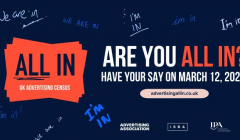
Why talent and skills retention matters to the future of creative campaigns
The All In Census lets talent have their say in shaping the industry.

A cross-industry working group, brought together by the Media Trust, has come together to tackle the disability inclusion crisis within the creative industries.

“We are limiting the horizons of disabled people by not representing them.” This was the rallying cry of Su-Mei Thompson, Chief Executive of the Media Trust, as she kicked-off a cross industry working group to reframe disability.
“We are at the risk of really important issues not being reported. Online hate crimes have risen by a third why haven’t these been reported?” she asked.
The event, which was run in partnership with Disability Rights UK and Scope, and sponsored by Channel 4, brought together a cross section of charities, advertising agencies and journalists. It kick started a conversation between organisations representing disabled people and the creative industries.
Sue Bott, Deputy Chief Executive of Disability Rights UK, explained, “What disables us is attitudes towards us as disabled people, that’s what really holds us back.” Bott highlighted the need to move away from the “medical model” of describing disabled people as a drain on society. She explained that changing attitudes will enable both disabled individuals to thrive and for society to get “the benefits of all our talent.”
James Taylor, Head of Campaigns, Public affairs and Policy at Scope, took aim at the lack of representation of disabled people on screen. He pointed to the fact that 14 million people in the UK are disabled, a figure which equates to one in five people.
Taylor noted that when adverts did represent people with disabilities it was often in a very one-dimensional way: “We are seeing adverts that are perpetuating stereotypes that we are all inspiring, we are all heroes, which does an injustice to the experiences we face.”
He pointed to the importance of humour in addressing people’s “innocently ignorant” awkwardness around disability. With so many brands standing on the side-lines when it comes to this issue, he urged the industry to “look to incidental portrayal as much as realistic portrayal.”
What disables us is attitudes towards us as disabled people, that’s what really holds us back.
Sue Bott
In a highly competitive economic environment Emma Gardner, Managing Partner of Elvis, pointed to the fact that disabled people equate to the second largest market globally, behind women. When disability touches 53% of consumers, Gardner argues that getting over the “fear of getting it wrong” should be a business priority.
She explained that diversity in your environment and in the output creates more impactful work. She explained, “We talk about diversity in advertising a lot, but agencies don’t necessarily include disability in that.”
Looking at the best creative work that has helped to reframe disability, Gardner noted that 2016 is still the year the industry refers back to, as that was the year Maltesers won Channel 4’s Diversity in Advertising Award with a campaign featuring disability.
Gardner urged the creative industries to “push forward and try” when it comes to representation. She explained, “Particularly in advertising you have to steady yourself for the backlash, but we need to move away from antiquated behaviours. Cries of tokenism is hard, but we need to start something, hold your nerve and then do better.”
With that focus on overcoming fear and doing better front of mind, cross industry teams joined forces with disability organisations and charities to think about how to better reframe disability.
Groups presented a plethora of ideas to push for progress which spanned everything from inclusive recruitment to reframing the concept of disability for everyone. Noting that if you are not disabled now, maybe you will be in the future.
While a diverse range of perspectives and groups were represented, the belief in the need for radical action was universal.
Su-Mei Thompson, Chief Executive of the Media Trust unpacks the key action points for change.
The fact that society has prioritised tackling gender, racial and LGBT discrimination over disability is both good and bad. It’s bad because we have a lot of catching up to do but good because we can learn from models and approaches that have worked for other communities so hopefully, we can move that much further faster.
At Media Trust, we are so encouraged by the energy and enthusiasm on the part of everyone who came, but we aren’t underestimating how challenging it will be to achieve the kind of progress we’d like to see. It’s clear we need systemic change not just one or two examples of great ads or disabled presenters or dramas featuring disabled actors. We’re hoping the Reframing Disability event will be the start of concerted and collaborative action on the part of the media and creative sector to reframe how disability is represented in the media.
At Media Trust, we are now going to collect, analyse and synthesise the feedback and ideas from all of the groups and come up with a first pass of a summit write up which we will share first with a steering group comprising our supporting partner organisations for the event and others to decide on next steps. I would say it’s very likely that next steps will see Media Trust convene separate thematic working groups comprising media and creative industry participants and disability charities to take forward the work we've started, leading up to an overarching charter for media organisations to tackle the under-representation of disability in the media.
The Reframing Disability event really shows what can be achieved when you bring together the media and creative industry with charities and people with lived experience of disability to collectively and collaboratively brainstorm ideas and possible solutions. Themes included:
Looks like you need to create a Creativebrief account to perform this action.
Create account Sign inLooks like you need to create a Creativebrief account to perform this action.
Create account Sign in